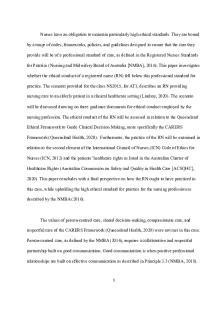Reflection Assessment Task 1 PDF

| Title | Reflection Assessment Task 1 |
|---|---|
| Course | Keeping the Past |
| Institution | Western Sydney University |
| Pages | 4 |
| File Size | 240.7 KB |
| File Type | |
| Total Downloads | 40 |
| Total Views | 160 |
Summary
reflection assessment 1...
Description
Although olive oil is easily accessible globally, to me it contains significant parts of my identity and Lebanese heritage. This is because, in our industrialised world, olive oil is easily produced using hydraulic machines. This is not the case for my family in the northern villages of Lebanon. The significance of olive oil to Lebanon dates back six-thousand years ago, where the major civilisations of the Mediterranean produced and distributed olive oil across the Middle East (inolioveritas, 2019). This development spread as far as Rome, where the olive tree is still being used as a symbol of peace. Olive oil was also used as a form of currency, where the Phoenicians would trade it for the gold and papyrus of the Egyptians (Pizzeria, 2015). Olive oil remained a lucrative source of income for many Lebanese families, through civil wars and endless economic fluctuations. Families that own hectares of olive trees are perceived as financially stable. This is because they own olive press factories, whereby they can produce and export oil globally. The traditional method of producing olive oil begins with the grinding process, where the olives are placed under large millstones, that separate the pits from the olives and transform them into a smooth paste. This paste is then placed onto stacked natural fibres in the form of large discs that separate the liquid residue from the paste. This residue is then separated through the process of decantation, where it settles and ages naturally (Pizzeria, 2015). Despite the development of modern technology, my grandparents have carried down their ancestors’ traditional olive press factory, generating and exporting olive oil since nineteen sixty. This is very significant to my family heritage, as before immigrating to Australia, my mother and her family would prepare annually for the month of September, to harvest, grind, and export oil. The earnings made from the exports were used to purchase necessities in preparation for the unforgiving winter. Our family in Lebanon continues to produce and export olive oil to us in Australia today. Every year, we expect a large gallon at our doorstep, and we look forward to it eagerly.
The significance of olive oil is paramount to my family’s heritage, as this object shaped my childhood and identity. As a young girl, my parents made sure to plan a trip to Lebanon annually. Our extended family would welcome us with a feast upon our arrival. This feast would include many meals that consisted of olives and olive oil. Whilst eating these foods, my grandparents would remind me of the successful season they’ve had in olive harvesting. Although I am currently living in Australia, the taste of this authentic oil continues to provide me with an insight into my home, away from home. Just consuming it with a simple dip, brings back many memories of my visits to Lebanon and my family’s olive press factory there. It also helps sustain my Lebanese identity, by allowing me to envisage the hardships my ancestors endured during the wars and economic fluctuations. Through using my family’s traditional oil, I feel proud because it symbolises their ability to rise from the pain of poverty by using their olives as an income source. Therefore, it is no surprise that store-bought olive oil is harshly frowned upon in my family.
References inolioveritas. (2019, July 9). The Lebanese olive oil. In Olio Veritas. https://inolioveritas.org/2019/07/09/the-lebanese-olive-oil/ Pizzeria, M. (2015, August 25). The importance of Olive Oil. Manoosh Pizzeria. https://www.manoosh.com.au/the-importance-ofolive-oil/#:~:text=Tasty%2C%20healthy%2C%20versatile...
Similar Free PDFs

Reflection Assessment Task 1
- 4 Pages

TASK 1 Reflection
- 1 Pages

BSBPMG522 Assessment Task 1
- 9 Pages

Assessment TASK 1 – Scenario
- 5 Pages

Assessment Task 1
- 2 Pages

NS2015 Assessment Task 1
- 7 Pages

Assessment Task
- 3 Pages

Bsbcrt 412 - Assessment Task 1
- 5 Pages

Bsbcmm 511 - Assessment Task 1
- 14 Pages

Task 3- Reflection Paper
- 3 Pages
Popular Institutions
- Tinajero National High School - Annex
- Politeknik Caltex Riau
- Yokohama City University
- SGT University
- University of Al-Qadisiyah
- Divine Word College of Vigan
- Techniek College Rotterdam
- Universidade de Santiago
- Universiti Teknologi MARA Cawangan Johor Kampus Pasir Gudang
- Poltekkes Kemenkes Yogyakarta
- Baguio City National High School
- Colegio san marcos
- preparatoria uno
- Centro de Bachillerato Tecnológico Industrial y de Servicios No. 107
- Dalian Maritime University
- Quang Trung Secondary School
- Colegio Tecnológico en Informática
- Corporación Regional de Educación Superior
- Grupo CEDVA
- Dar Al Uloom University
- Centro de Estudios Preuniversitarios de la Universidad Nacional de Ingeniería
- 上智大学
- Aakash International School, Nuna Majara
- San Felipe Neri Catholic School
- Kang Chiao International School - New Taipei City
- Misamis Occidental National High School
- Institución Educativa Escuela Normal Juan Ladrilleros
- Kolehiyo ng Pantukan
- Batanes State College
- Instituto Continental
- Sekolah Menengah Kejuruan Kesehatan Kaltara (Tarakan)
- Colegio de La Inmaculada Concepcion - Cebu





